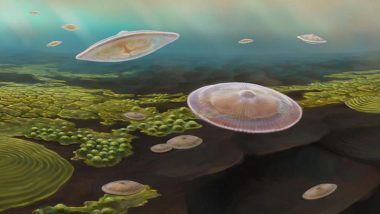New research suggests complex life on Earth began 1.5 billion years earlier than previously thought. We review the top origin of life theories. For centuries, humanity has wondered about the origin of living things on Earth, of existence — ultimately, where we come from and where we are going.
It's a question that involves the core sciences of chemistry, biology and physics, but also philosophy, psychology and elements of faith. And the earliest academics had a hand in all areas of enquiry. But those core sciences are generally considered more precise and easier to measure than the others and that's where scientists tend to focus their attentions today.
In the 19th century, French chemist Louis Pasteur demonstrated that life always comes from life. Plants, animals, and microbes reproduce within their respective species. But what about the original lifeform? If it arose from inanimate matter, when and how did it happen?
Life may be much older than we thought
A study led by Cardiff University in Wales, UK, suggests that complex life on Earth could have begun 1.5 billion years earlier than previously thought. Researchers claim to have found evidence within rocks in Gabon that indicate conditions suitable for life 2.1 billion years ago.
Published in the journal Precambrian Research, the study suggests that the collision of two continental plates more than 2 billion years ago created a nutrient-rich environment that allowed the evolution of complex organisms. That would have produced phosphorus and marine oxygen crucial for the transition from unicellular organisms to more complex forms of life.
However, their existence was brief — it seems these complex lifeforms were restricted to an inland sea and could not expand globally. This research challenges an established scientific consensus that animal life appeared 635 million years ago, and suggests an initial, failed attempt at complex life on Earth.
What other theories exist about the origin of terrestrial life?
Some scientists have expressed doubts about the new findings and called for further research. But the study has reopened the debate about the emergence of complex life on Earth. Over the past century, scientists have developed a handful of . Here, we review some of the most prevalent ones.
1. The Primordial Soup theory
One of the most widespread theories is the "primordial soup" theory, which suggests that life arose from organic compounds in a primitive ocean. British biologist Charles Darwin (1809-1882) was the first to suggest that life could have begun in "a warm little pond."
However, it wasn't until the 1950s that his theory was tested. American chemist and Nobel Laureate, Harold Urey, and probiotic chemist Stanley Miller created a primitive atmosphere in a laboratory. They mixed water, methane, ammonia, and hydrogen in a closed container and introduced electric sparks to simulate lightning as a catalyst. After several days, amino acids, the basic building blocks of life, had formed.
2. The cosmic life theory
Another intriguing theory is that terrestrial life was originally extraterrestrial — from outer space. According to this hypothesis, life forms, or at least the basic components necessary for life, came from space and settled on Earth.
This line of thought doesn't specify exactly where life originated or in what form it arrived on our planet. But the most widespread idea is that it could have been brought here when a meteorite, carrying microorganisms, impacted Earth.
Two of the original proponents of this theory were British astrophysicists Fred Hoyle and Chandra Wickramasinghe. Their work in the 1970s suggested that comets contain enough organic matter to seed life on planets such as Earth.
3. The hydrothermal vent theory
The hydrothermal vent theory suggests that life on Earth could have begun on the ocean floor, around hydrothermal vents. These vents are openings in the seabed that expel hot, mineral-rich water.
British geologist and member of the NASA Astrobiology Institute, Michael Russell, proposed that alkaline hydrothermal vents, which emit hydrogen, hydrogen sulfide, and methane, could have provided the ideal conditions for the formation of simple organic molecules.
Although the conditions around hydrothermal vents are considered extreme — they can reach temperatures as high as 400°C (752°F), there are microorganisms that live in these environments using chemosynthesis.
Chemosynthesis is a process through which microbes make their own food. They use energy from chemical reactions instead of sunlight. This allows them to live in dark places, such as the ocean floor.
4. The RNA world
The RNA world hypothesis proposes that long before the existence of DNA and proteins, life on Earth was based on a versatile molecule: RNA (ribonucleic acid).
DNA (deoxyribonucleic acid) allows organisms to develop, survive and reproduce and. DNA sequences are converted into messages, or instructions, that enable the production of proteins — complex molecules that are responsible for almost everything that happens in our bodies — and keeps us alive.
RNA, on the other hand, performs these two essential functions for life: It stores genetic information and acts as a catalyst for essential chemical reactions.
In the 1980s, the chemists Thomas Cech and Sidney Altman discovered ribozymes, RNA molecules with enzymatic activity, and were awarded a Nobel Prize.
Scientists have since proposed that RNA molecules capable of self-replication and catalyzing simple reactions preceded current living beings, and that, over time, proteins — which are more efficient catalysts — replaced ribozymes.
There are more theories about the origins of life. But these are the ones that have received the most attention from the scientific community. All — including the latest from Cardiff University — highlight the complexity of the question that continues to intrigue and fascinate us today
Primary source:
Complex life on Earth began around 1.5 billion years earlier than previously thought, new study claims, Cardiff University, July 29, 2024 https://www.cardiff.ac.uk/news/view/2830233-complex-life-on-earth-began-around-1.5-billion-years-earlier-than-previously-thought,-new-study-claims
(The above story first appeared on LatestLY on Aug 01, 2024 05:50 PM IST. For more news and updates on politics, world, sports, entertainment and lifestyle, log on to our website latestly.com).













 Quickly
Quickly












